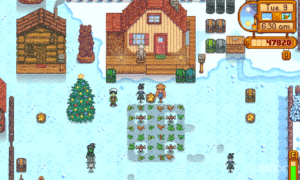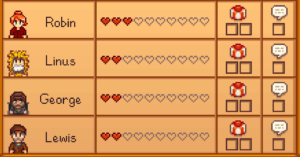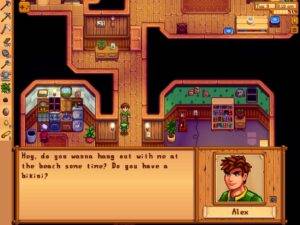Stardew Valley is an indie farming simulation game created by Eric Barone (ConcernedApe), first released in 2016. In the game, players inherit a run-down farm and work to restore it by growing crops, raising livestock, crafting goods, mining, and fishing. Additionally, players can interact with the local community, participate in festivals, and build relationships. Available on PC, PlayStation, Xbox, Nintendo Switch, and mobile devices, Stardew Valley appeals to a broad audience, including fans of farming sims like Harvest Moon, those who enjoy open-ended sandbox games, and gamers seeking a relaxing and engaging experience.

[ Farm during winter time ]
Examining Stardew Valley through a feminist lens reveals that while the game incorporates several feminist ideals/mechanics, such as inclusive relationship options, a non-linear narrative structure, and its heavy focus on agency, it falls short, however, in fully challenging traditional gender roles and capitalist frameworks.
The core concept of agency, central to feminist theory, becomes a powerful tool within Stardew Valley’s mechanics. The game empowers players through core mechanics like farming, crafting, mining, fishing, and building relationships. This agency, however, extends beyond simply playing as a female character. We can actively challenge the game’s subtle gender norms. The professions, for instance, carry traditional associations where carpentry or fishing are often male-dominated and cooking, nurturing animals are typically perceived as more feminine. Stardew Valley’s open-ended gameplay allows players to redefine these roles and challenge stereotypes . For instance, players can choose to specialize their character in skills traditionally associated with the opposite gender, directly challenging societal norms both within the game and in reality.

[ Relationship status with NPCs ]
However, a feminist Stardew Valley experience goes beyond individual actions. Stardew Valley’s community mechanic offers ways to dismantle power structures. The game prioritizes cooperation over competition. By actively helping NPCs through quests, participating in festivals, and building strong relationships, players can foster a sense of collective well-being. The game’s same-sex marriage option also allows for more agency and aligns with the feminist emphasis on diverse narratives, providing players with the opportunity to explore relationships outside of heteronormative expectations. Players can choose to pursue a relationship that resonates with their identity, or they may opt to forgo romance altogether, focusing instead on building strong friendships. This approach resonates with the concept of “never-ending narrative middle” as we prioritize the journey of building a fulfilling life over the traditional goal of marriage.
Stardew also creates a broader definition of success. The agency of the game also allows players to prioritize activities beyond profit maximization and material wealth. Instead, leisure activities, friendships, and personal growth can become equally important aspects of leading a fulfilling life – challenging the traditional association of success with wealth accumulation and productivity, offering players the freedom to define success on their own.
The game also encourages players to consider the broader societal issues. The presence of Joja Corporation, with its capitalist agenda, presents a subtle critique of corporate power structures. A feminist approach encourages layers to prioritize local businesses and sustainable practices over the convenience offered by Joja (opened at later hours, sometimes lower rates). This aligns with the concept of games offering opportunities to explore social issues in a safe space, allowing players to engage with topics such as corporate influence and sustainability within the context of the game. Through the participation of the community center, interactions with NPCs, and challenging capitalist norms, players can actively participate in reshaping the game world.

[ Quest posting ]
While Stardew Valley offers a wide breadth of professions and agency, the character arcs and character interactions can sometimes fall into stereotypical patterns that do not fully escape conventional gender norms. For instance, some NPCs in the game exhibit gender-specific dialogues that reinforce traditional gender stereotypes. Like Alex, who asks female players if they own a bikini, which can be seen as objectifying. This type of dialogue suggests a lingering adherence to conventional gender expectations within the game. The line between individual achievements over the collective action is often blurred in Stardew Valley. The focus on personal success often outshines playing for the benefit of the community. Even with interactions with NPCs, players can start to become strategic with their relationships for their own personal gain. For instance, players can unlock tea sapling from Caroline early game which sells for high value after Caroline’s 2 heart event.

[ Alex dialogue, source Reddit ]
In all, playing Stardew Valley as a feminist means appreciating its structural and thematic departures from traditional narratives, recognizing its inclusive aspects, and critically engaging with its limitations regarding gender norms and capitalist underpinnings. The game offers a valuable space for exploring feminist ideas, even as it prompts further reflection on how games can more effectively challenge systemic issues.



